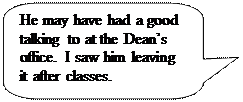| Non-Perfect | Perfect |
| Форма Non-Perfect употребляется: · для обозначения действия, происходящего одновременно с действием, выраженным сказуемым: I am glad to see you. Я рад вас видеть. · для обозначения действия безотносительно ко времени его совершения: To swim is pleasant. Плавать приятно. | Форма Perfectупотребляется для обозначения действия, предшествующего действию, выраженному сказуемым: I am glad to have seen him. Я рад, что повидал его. |
Отрицательная форма инфинитива образуется при помощи отрицательной частицы not, которая ставится перед инфинитивом.
Не was told not to book tickets for the train.
Его попросили не заказывать билеты на поезд.

|
Exercise 1. Use the infinitive in brackets in the active or passive voice.
1. There was a chance for her (to turn) over a new leaf in her life.
2. Her dress which was in the bag had (to iron).
3. I wanted no one (to take) notice of me.
4. There's nothing more (to see) here.
5. I wanted (to persuade) her, (to clear) things up - or to let things (to clear) up by you.
6. She seemed (to lose) heart in the business after that.
7. Helen is one of those people whose fate is (to devote) to others
8. I hoped that I should never (to send) to that war.
9. Outside men's voices could (to hear).
10. The cows were driven into the yard (to milk).
Exercise 2. Paraphrase the following sentences using the Infinitive Active and Passive.
1. Ann was struck when she heard of his sudden death.
2. When he felt worse, he was sorry that he hadn't consulted the doctor.
3. They were shocked when they found the flat in such an awful mess.
4. She was afraid she might be taken to hospital.
5. She was extremely happy when she found her children safe and sound.
6. Nick was sure that he would be offered a vacancy.
7. She was lucky enough that she’d been given another chance to admire the masterpiece.
8. She was afraid that she would burst into tears again.
Exercise 3. Respond to the following using the necessary form of the Infinitive Active and Passive after the modal verbs.



 Student A: Student B:
Student A: Student B:
1. We are still on bad terms, you know. (might, to apologize)
2. His recovery was quite a miracle. (may, not to give up hope)
3. His bad habit of biting nails irritates me. (must, to be very nervous)
4. She's absolutely washed out. (must, not to sleep a wink last night)
5. She's such a tease. (should, to teach her a lesson)
6. I don't quite like the programme we’ve made up. (can, to be changed)
7. She's been in low spirits since morning. (must, to be hurt)
8. The boy’s shivering all over. (may, to be frightened by a thunder)
9. She had a new attack of appendicitis the other day. (should, to be operated on)
10. She was beaming with pride. (must, to be conferred a diploma)
Exercise 4. Use the infinitive in brackets in the perfect or non-perfect form.

|
1. He was sorry (to miss) so many classes before the exams.
2. I started (to walk) on tiptoe.
3. We are happy (to score) another goal. Now we are going to win!
4. She is not likely (to take) him into her confidence.
5. We must (to sit) there, with scarcely a word, for over an hour.
6. She was relieved (to feel) that she wasn’t alone.
7. He tried (to give) her a ring for Christmas.
8. I am sorry (to offend) you in public.
Exercise 5. Use the verbs in brackets in the required form.
1. I like (give) presents to friends, but even more I like (give) gifts.
2. She is so lucky (have) such a good family, (see) their love and care.
3. One more window remained (wash).
4. The child is so pale! She ought (have) a change of food and air.
5. I want (take) my words back. I'm sorry (call) your name.
6. The case was urgent. The man had (operate on).
7. He was sorry (not notice) the fax on the secretary's table.
8. But what kind of rules might (require)?
9. The rules (leave) to the Government to decide.
10. Everybody is going (give) a rise.
11. Parenthood is the only 24-hour-a-day job for which you (not pay).
12. English people don't like (tell) what to do.
Exercise 6. Translate into English.
1. Я очень сожалею, что не заказала лекарство вчера.
2. Она надеялась, что пройдет рентген до начала занятий, но не успeла.
3. Николай счастлив, что ему дали стипендию.
4. Она, должно быть, тратит много денег на книги.
5. Он хотел прочитать курс лекций по современному искусству, но его неожиданно послали в командировку в Москву.
6. Ей очень не повезло, что она сломала ногу.
7. Он сожалел, что не пошел на прощальный ужин.
8. Она боялась, что не догонит группу, так как проболела целый месяц.
9. Футболисты были счастливы, что выиграли матч.
10. Студенты довольны, что получили хорошие оценки на экзамене.
 |
 Инфинитив без частицы to
Инфинитив без частицы to
В современном английском языке инфинитив употребляется с частицей to. Однако, в следующих случаях частица to не употребляется:






